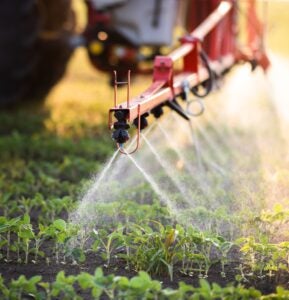I started the “Farm Babe” social media outreach platform almost nine years ago now, and one of the reasons I did that was to “mythbust” popular food labels.
You see, I was once a big city girl turned farmer. I went to college in Los Angeles and lived in downtown Chicago before eventually meeting and dating a farmer and moving to rural Iowa for love. I spent a majority of my 30s living and farming there, where I started to learn the real facts behind our food — directly from the people growing it.
Why do I share this with you?
Reason being is because I get it. When you’re in a big city like Los Angeles, you don’t often get to talk to farmers. You’re surrounded by marketing, trends, ideologies, social circles, and pressures. And it was about that time (around 15 years ago now) that I had once fallen victim to every food labeling myth under the sun. My personal trainer told me that I had to go gluten-free if I wanted to slim down and get fit. (wrong) I watched Food, Inc., which convinced me that livestock were “pumped full” of hormones and antibiotics on factory farms … (triple-y wrong!). I believed that organic meant pesticide-free and so on.
Also wrong!
When I started busting popular food myths and learned organic used pesticides, I felt so deceived. Do you feel that way?
The truth is, food companies lie and deceive us every single day in order to try to sell a product. The truth is, any farmer can do a great job regardless of size or label. The truth is that our food supply is extremely regulated and safe — farmers often eat what they grow, directly out of their fields. The more I continue to learn, the more I am impressed that the food supply is not all “doom and gloom” that the media often times may lead us to believe.
» Related: The list of organic pesticides approved by the USDA
I used to be a big supporter of the organic label “back in the day.” To an extent, I still am. I have many organic farmer friends who are great people and believe we shouldn’t put down others to sell a product. Becoming certified under these set of organic standards can be expensive and tedious. Organic can sometimes allow farmers to be more profitable — or so we hope.
Are the corporations and government still making all the profits for this niche label? Perhaps.
Are you shocked? Probably not.
As shoppers we should be outraged that food corporations can get away with so much. I hate to say it, but organic farming also tends to use more of certain types of pesticides (particularly insecticides and fungicides) than their non-organic farm counterparts.
But let’s make this clear: Pesticide use varies greatly depending on pest pressure and region.
For example, pest pressure from insects and disease can be higher in a humid, hot, tropical, wet climate. Think Michigan apples (wet) or Florida citrus (humid.) Fruits and vegetables are delicious, but bugs think so too! Just because a field is “organic” doesn’t mean that pests such as animals and insects won’t enter! Yes, there are best management practices in place to mitigate pest pressure, but non-organic farms can do that too.

On the flip side, drier, colder climates might not need to use any pesticides — organic or not! No farmer wants to use them as pesticides are expensive, tedious to manage, and time consuming to apply. Precision application and dosage is crucial to getting desired results when applying insecticides, herbicides, fungicides or anything similar. And while organic product are non-synthetic, that doesn’t tell us anything about toxicity or what, if any, federal regulations there are behind them. “Naturally derived” means nothing in terms of safety, and in some cases, pesticide manufacturers will change an inert ingredient to make the product approved by the Organic Materials Review Institute, which manages a massive list of thousands of branded organic pesticide products.
But here’s the deal. Pesticides (also known as crop protection products) are a vital part of plant health and have been used in agriculture for thousands of years. The good news is that newer developed products are safer. More good news is that crop protection products are applied very minimally; usually just a few ounces an acre. And more good news? There are “pre harvest interval” times, where you can’t spray for a certain amount of time before harvesting to ensure proper food safety — and in most cases, our foods are washed and sanitized before they get to us anyway.
Of course, anything that comes off of a farm is much healthier for you than anything processed from a box, like cookies! Fresh produce is the healthiest diet option, regardless of whether it’s labeled organic or not.
So what do you purchase? I’d recommend locally grown: Support your community and your own country when possible, to keep local farmers profitable and on their family farms. Regardless though, rest assured that your food supply is very well regulated and safe. This isn’t meant to put down organics, but it is important to be an informed shopper and know what you’re purchasing. Sometimes the higher price tag on a food item in the grocery store is just that — a higher price tag.
Michelle Miller, the “Farm Babe,” is an internationally recognized keynote speaker, writer, and social media influencer and travels full time to advocate for agriculture. She comes from an Iowa-based row crop and livestock farming background and now resides on a timber farm in North Central Florida.



